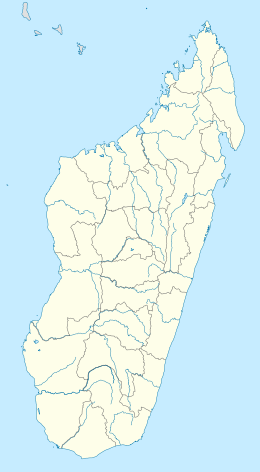 Beach on Nosy Komba | |
| Geography | |
|---|---|
| Location | Madagascar |
| Coordinates | 13°28′S 48°21′E / 13.47°S 48.35°E |
| Area | 27.9 km2 (10.8 sq mi) |
| Highest elevation | 622 m (2041 ft) |
| Highest point | Antaninaombi |
| Administration | |
Madagascar | |
| Region | Diana Region |
| District | Nosy-Be District |
Nosy Komba (Malagasy pronunciation: [nusʲ ˈkuᵐba]; lit. 'island of lemurs') is a small volcanic island in Madagascar, situated between the island of Nosy Be and the northwestern coast of the main island of Madagascar. Roughly circular, it rises sharply towards a plateau and the summit of Antaninaombi at the center of the island. The lowlands of the island are divided between secondary forest and a patchwork of farmland and plantations (notably including shade-grown coffee), while the highlands are mainly scrubland. Heavily deforested over the 19th and 20th centuries, only small pockets of old-growth forest remain in rural gullies and hills. The island experiences a heavy dry season typical of northwestern Madagascar, and is dotted by bamboo and Fabaceae trees, alongside the non-native mango and jackfruit. The island hosts a diverse range of reptiles and amphibians, although this has been slightly reduced by past deforestation. The island is known for its namesake black lemurs, an additional nocturnal species of lemur has not been sighted on the island since the 1990s.
During the early 19th century, the region was heavily settled by Sakalava refugees and their slaves fleeing the hegemony of the Merina Kingdom. France gained control of the island in 1840, and soon used it as a sanatorium retreat and as a center for their colonial labor force. The population of Nosy Komba, mainly restricted to the northern half of the island, relies on ecotourism and handicraft, supplemented by a wide range of agricultural products such as coffee, vanilla, cacao, and sugar cane. A number of hotels and guest houses support tourists to the island, mainly on short excursions from Nosy Be.
